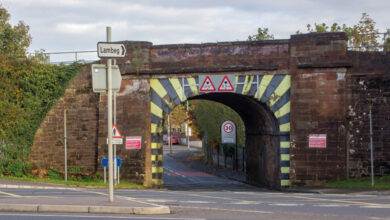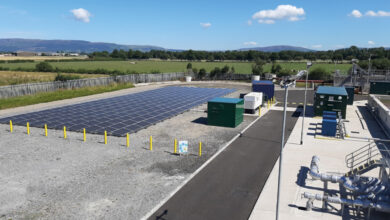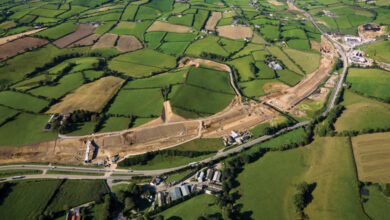Building acceptance for renewables
 A confrontational approach by wind farm developers only adds to local opposition, when the planning system should be a fair forum for debate. Planning academic Geraint Ellis outlines his research findings to Peter Cheney.
A confrontational approach by wind farm developers only adds to local opposition, when the planning system should be a fair forum for debate. Planning academic Geraint Ellis outlines his research findings to Peter Cheney.
Planning should be seen as a vital forum for debating society’s future rather than a battleground between residents and developers, according to Geraint Ellis.
A senior lecturer at Queen’s University’s School of Planning, Architecture and Civil Engineering, he points out that opposition to renewable energy projects is sure to increase when developers deploy the “language of war”.
Ellis is keen to take research and make it work for society: better, evidence-based planning in this case. His interest in the public acceptance of renewables started 10 years ago when he was studying why local residents were opposed to the Tunnes plateau off the north coast.
“In Northern Ireland, and in Ireland in general, there had been hardly any opposition to onshore wind,” he says, “and the idea of developing offshore was that there would be fewer objections but in fact it was the other way round.” Objections to wind are now “slowly growing” across the island.
Many developers think that as long as they can get planning permission, they can cope with the opposition. The planning system is therefore viewed as “a problem and a burden to get over rather than something that can help.” Government departments responsible for energy almost always take the same view, he finds.
The system, though, exists for all of us and exists to resolve these conflicts. Developers should seek to understand why the dispute is taking place and promote support for their development, rather than simply reducing the level of opposition.
“Sometimes the language they use is one of war: ‘pockets of resistance.’ Their solution is to try to overturn their irrationality on a one-by-one basis,” he comments. However, seeing objectors as the problem is “not helpful in the long run”, especially as society needs to undergo such a massive shift in how it uses energy.
Western society’s dependence on oil, he notes, is virtually complete with cars, consumer goods and food supplies all depending on oil fuels or oil-based products. Communities will therefore need to rely more on locally grown food, localised employment opportunities (with less need for travel) and locally generated energy.
Social interaction
“Society has such a fundamental relationship with energy that has to change,” Ellis remarks. “We thought it was an infrastructural problem rather than a societal problem and it’s sometimes easier to fix those hard issues (the technology and the infrastructure) rather than the soft issues where we are dealing with society, where we are dealing with society, perceptions and values. They’re much more difficult to get a grip on.”
Every new technology, Ellis contends, must be viewed not just as a technology in itself but alongside its interactions with society. “We all want an iPod,” for example, because Apple has made it an interactive product but wind energy is not necessarily seen as desirable.
While policy-makers understand the energy crisis, it is not well understood by the population as a whole. “People see oil prices but I don’t think they quite realise how that’s going to carry on and on,” Ellis contends. If they did realise that, renewable energy would be seen as a major positive.
Short-termism is also a barrier. “The shift to low carbon transition is going to take decades so we need a very long-term vision,” he explains.
The scale of the challenge makes community acceptance of renewable energy all the more important. And failing to get it right could “ultimately limit the amount of wind energy that Ireland can absorb and push applications closer to urban areas, where people will increasingly resent living beside turbines.
This is already playing out in Great Britain, where the cut in subsidies for wind (via renewable obligations certificates) was driven by pressure from Conservative MPs, themselves lobbied by constituents.
Local residents want to see a fair process, where public participation is a key value and people’s views are respected, however much one party to a dispute disagrees with them. Several disputes have been based on whether people trust the parties involved, rather than the merits of the scheme itself.
“If you call people NIMBYs, it means that ‘your view doesn’t count,’” he states. “That’s a view that suggests that people aren’t entitled to say what they feel.”
More community benefit schemes could help but these are not the silver bullet. Indeed, they are sometimes seen as a way of ‘buying’ planning permission or creating good PR for developers.
“In Denmark, when a wind farm is built now, 20 per cent ownership must be offered to the local community,” he points out. “They don’t have to buy it but at least it’s offered to them.”
Some English authorities have carried out wind auctions i.e. offering to buy the areas with the greatest wind resources from landowners, auctioning these to wind developers for the highest possible price, and putting the money back into the community.
While it’s often tempting to see a dispute as a snapshot of local public opinion, communities’ attitudes towards renewables can change over time. A study by University of Amsterdam academic Maarten Wolsink (published in 2008) suggests that people are generally supportive of wind but that turns into opposition when a planning application is lodged. However, where turbines are built and neighbours get used to their presence, support tends to increase again and may become even higher than before.





